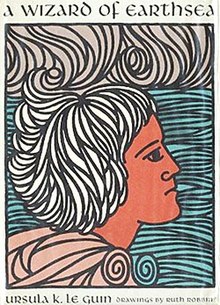
The first thing I did upon waking this morning was pick up my recently-purchased copy of Ursula K. Le Guin's A Wizard of Earthsea and eagerly consume the remainder of the book, which I had read last night until I could no longer keep my eyes open.
I was in sixth grade when I first encountered this book in the school library. I changed school districts just after finishing the book, and the new school didn't have the other books in the series, so it gradually fell by the wayside and was forgotten. Until recently, when I saw a copy at the Dawn Treader and remembered really enjoying it the first time around. I'm really glad I bought it when I had the chance, because this book has reminded me of why I fell in love with fantasy in the first place, and its stunning power to enrich our lives with fresh perspective.
I think I may have been too young to really appreciate this book the first time around, because there's a lot going on here that I didn't notice the first time around. I must have completely failed to realize that Ged (a.k.a. Sparrowhawk, the main character) is not a white guy like virtually all fantasy protagonists (his skin tone is described as "red-brown"). I also failed to realize what a big deal that is, especially for a book published in 1968, when (as Le Guin herself said it) "everybody in science fiction had to be a honky named Bob or Joe or Bill."

I also feel like I'm finally old enough to really understand and absorb the lessons which the book teaches about patience, self-knowledge, and the responsibility which comes with great power (I just wish I had taken these lessons more to heart as a young man, rather than insisting on learning them for myself, the hard way). As the Archmage says to Ged after the young man's pride and hubris have left him gravely injured and loosed a terrible evil upon the world:
You thought, as a boy, that a mage is one who can do anything. So I thought, once. So did we all. And the truth is that as a man's real power grows and his knowledge widens, ever the way he can follow grows narrower: until at last he chooses nothing, but does only and wholly what he must do....I was also captivated by the lovingly-rendered descriptions of sea and surf and sky, of windswept moors and mist-hidden isles, narrow flotsam-choked inlets, great calm bays, and the endless, heaving waterscape of the Open Sea. Le Guin has an anthropologist's eye for culture and and a naturalist's eye for setting, and it makes me appreciate my own landscape (and the lake right behind my new house) all the more fully.
